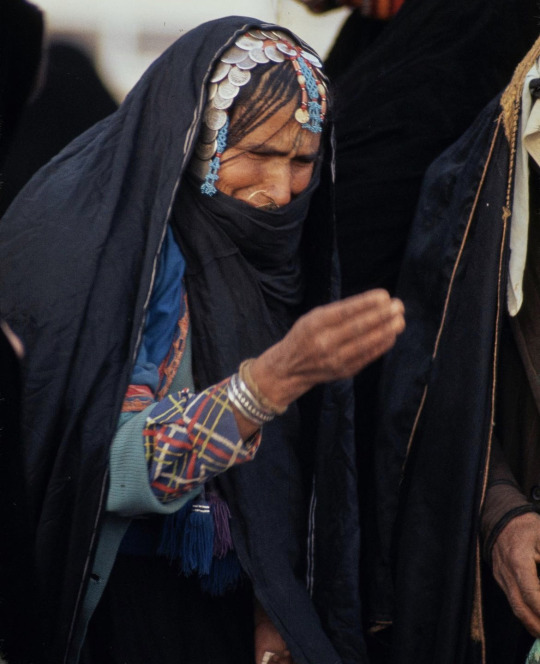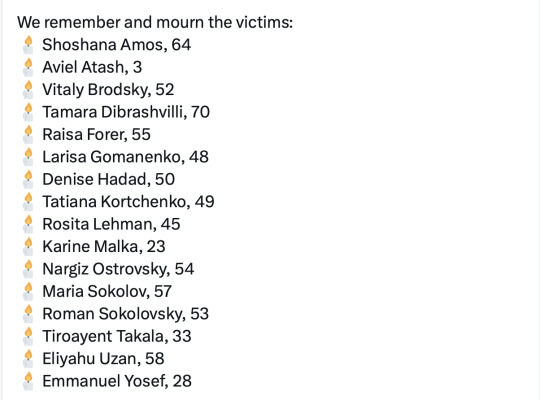#Beersheba
Text



Source
As one commenter said, it is a driver's license. It's still a British Mandate document.
77 notes
·
View notes
Text



Bedouin Market in Bir Seb’a - Photos of Palestinians at home and in the diaspora by National Geographic foreign editorial staff writer and photographer Thomas Abercrombie (1974-1975).
#palestine#west asia#middle east#levant#palestinian culture#vintage photography#asia#palestine photography#bir seb’a#Beersheba#Bedouin#Bedouin Palestinians
410 notes
·
View notes
Text

Orot Cinema
Beersheba, Israel
Architect-Zeev Rechter
67 notes
·
View notes
Text


Analysis from Ayman Nobani, and wounded IOF bastards
#free gaza#free palestine#gaza strip#irish solidarity with palestine#palestine#gaza#news on gaza#al jazeera#boycott israel#israel#Ayman Nobani#Analysis#iof terrorism#beersheba#Jerusalem
19 notes
·
View notes
Text



19 notes
·
View notes
Text

October 31st is still remembered by some in Australia for one of the last successful cavalry charges in the history of warfare, not for something called halloween.
" On October 31, 1917, the 4th Light Horse Brigade of Australia -- 500 riders strong -- was assembled four miles outside of the town of Beersheba (a city now part of Israel but then a southern outpost of the Ottoman Empire.) Across four miles of burning Sinai desert several thousand Turks were entrenched. The Australians had already ridden 170 miles to join Allied forces, mostly British. The Allies were essentially pinned down, forced to stay out of the three-mile range of the Turkish guns.
The 4th Light Horse was commanded by Brigadier-General William Grant, who was shocked to find the Allies were out of water. The horses in his cavalry were so dehydrated their lips cracked and bled. Somewhere around noon that day he looked across the desert and made a decision that even he thought was suicidal. But his horses were dying.
Grant mounted his horse, assembled his cavalry (scattered around so they would not make an easy target for German planes) and at 4:30PM rode to the front, drew what was then the world's longest bayonet, turned toward Beersheba and yelled "CHARGE !!!" "
Read the rest of this account here - https://www.colindangaard.com/australian-cavalry-charge
9 notes
·
View notes
Text
youtube
Abraham lived at Beersheba & this would have been one of his water sources the underground cistern built by the Canaanites. There is another well outside of the city. It is known as Abraham’s’ Well because he and his descendants used it.
#Beersheba#Beersheva#AbrahamsWell#Water#WaterCistern#Canannite#TelBeersheba#Bible#AbrahamIssacandJacob#Issac#Jacob#Negev#Israel#visitisrael#holyland#bibletravel#ChristianTravel#BiblicalTravel#NegevDesert#Desert#SouthIsrael#Patriachs#Genesis#DiscoverIsrael#Jesus#God#ByFaithMedia#ByFaith#Backholer#MaryBackholer
3 notes
·
View notes
Text

Hagar and Ishmael in the Wilderness
Artist: Christoffer Wilhelm Eckersberg (Danish, 1783–1853)
Genre: Religious Art
Date: 6 February 1813
Medium: Oil on Canvas
Collection: Nivaagaard Museum, Niva, Denmark
Who was Hagar?
According to the Book of Genesis, Hagar was an Egyptian slave, a handmaiden of Sarah (then known as Sarai), whom Sarah gave to her own husband Abram (later renamed Abraham) as a wife to bear him a child. Abraham's firstborn son, through Hagar, Ishmael, became the progenitor of the Ishmaelites, generally taken to be the Arabs.
Biblical Account
Later, Sarah gave birth to Isaac, and the tension between the women returned. At a celebration after Isaac was weaned, Sarah found the teenage Ishmael mocking her son (Genesis 21:9). She was so upset by the idea of Ishmael inheriting their wealth, that she demanded that Abraham send Hagar and her son away. She declared that Ishmael would not share in Isaac's inheritance. Abraham was greatly distressed, but God told Abraham to do as his wife commanded because God's promise would be carried out through Isaac; Ishmael would be made into a great nation as well because he was Abraham's offspring. Abraham brought Hagar and Ishmael out together. Abraham gave Hagar bread and water then sent them into the wilderness of Beersheba.
Note
The painting of Hagar and Ismael was done while Eckersberg was in Paris. In his diary he notes the finishing date as February 6, 1813, but he signed it "E. 1812". The woman posing as Hagar is his girlfriend in Paris, the model Emilie. Source: Kasper Monrad, Eckersberg, page 202.
#religious art#old testament#hagar#ishmael#wilderness#christoffer wilhelm eckersberg#danish painter#19th century painting#european#biblical#christianity#christian art#beersheba#sarah#abraham#book of genesis
1 note
·
View note
Text
May 17, 2024 Memory Verse

View On WordPress
#Amos 5:4-5#Beersheba#do not go#do not journey#do not seek Bethel#Gilgal#God says#house of Israel#Live#Memory Verse#Seek God
0 notes
Text
Export of Heavy Duty Conveyor in Israel

Laxmi Pharma Equipment is a leading Manufacturer, Supplier, and Export of Heavy Duty Conveyor in Israel, specializing in pharmaceutical machinery.
Established in 1985 in Phase III, Vatva, Ahmedabad, Gujarat, India, the company offers a comprehensive range of high-quality equipment, including Washing Machines, Filling Machines, Stoppering Machines, Capping Machines, Labelling Machines, Packaging Machines, Process Equipment, and more.
Heavy-duty conveyors play a significant role in enhancing efficiency, safety, and productivity in the pharmaceutical sector.
These conveyors operate using a motor to drive a belt or chain, facilitating the movement of materials or products within a facility.
Features:
Durability: Built to withstand demanding industrial environments, ensuring longevity.
Handling Capacity: Engineered to handle substantial weights, suitable for transporting large and heavy products or materials.
Variety: Available in various types, including belt conveyors, roller conveyors, and chain conveyors, catering to different material handling needs.
Customization: Can be customized to fit specific requirements, offering flexibility in design and functionality.
Variable Speed Control: Many heavy-duty conveyors feature variable speed control, allowing operators to adjust speed based on production or processing requirements.
Directional Movement: Capable of moving materials in different directions (forward, reverse, incline/decline), providing flexibility in material flow.
Ease of Maintenance: Designed for easy maintenance, with accessible components like bearings and belts for inspection and replacement.
Geographical Availability:
Laxmi Pharma Equipment Export of Heavy Duty Conveyor in Israel Including Ashdod, Ashqelon, Bat Yam,
Beersheba, Bet Sheʾan, Bet Sheʿarim, Bnei Brak, Caesarea, Dimona, Dor, Elat, ʿEn Gedi, Givʿatayim, H̱adera,
Haifa, Herzliyya, H̱olon, Jerusalem, Karmiʾel, Kefar Sava, Lod, Meron, Nahariyya, Nazareth, Netanya, Petaẖ Tiqwa, Qiryat Shemona, Ramat Gan, Ramla, Reẖovot, Rishon LeẔiyyon, Sedom, Tel Aviv–Yafo, Tiberias, Ẕefat.
For inquiries and information, customers are welcome to contact Laxmi Pharma Equipment.
Read the full article
#Ashdod#Ashqelon#BatYam#Beersheba#BetSheʾan#BetSheʿarim#BneiBrak#bottlefillingmachines#Caesarea#Cosmetics#Dimona#Dor#Elat#ExportofHeavyDutyConveyor#ExportofHeavyDutyConveyorinIsrael#Exporter#Givʿatayim#H̱adera#Haifa#HeavyDutyConveyorinIsrael#Herzliyya#H̱olon#India#Jerusalem#Karmiʾel#KefarSava#liquidfillingmachines#Lod#Manufacturer#ManufacturerofHeavyDutyConveyor
0 notes
Text

BOURKOU' FACE VEIL :
Traditionally worn by Bedouin women from the Khan Yunis, Rafah and Beer Shebba areas. The band that goes across the forehead is usually hand-woven and embroidered in silk, sometimes decorated with silver coins. The veil itself is made of transparent crepe, heavily adorned with Turkish coins. It is tied around the head with braided wool cord. From the temples hang strands of colored glass beads and a variety of stones followed by silver chains with pendants, zinja. The veil shown here are forty to fifty years old. A less eldborate face veil is first worn by a girl when she reaches puberty. The dowry coins are added after her engagement. Maidens and married women generally did not wear a veil when they went about their daily routines in camp. They put it on when leaving the camp or when receiving unrelated males in.
#palestine#west asia#middle east#levant#asia#palestinian culture#traditional jewelry#traditional clothing#folk clothing#Beersheba#Bedouin Palestinians#Bedouin culture
234 notes
·
View notes
Text
Genesis 46:1-3 - Part 1 - JACOB AND A BRIDGE TO THE UNKNOWN
Jacob is now an old man. He knows that the land of Canaan was promised to his descendants and yet he is about to move to Egypt. He has lived in this promised land for a long time now and no doubt leaving it has given him reason to pause and reflect.
Bridge into the Unknown © Created by Ross Cochrane using NightCafe AI, Unsplash and PaintDotNet
Genesis 46:1-3 – Part 1 – JACOB AND A BRIDGE TO THE UNKNOWN
Genesis 46:1 says, “So Jacob set out for Egypt with all his possessions. And when he came to Beersheba, he offered sacrifices to the God of his father, Isaac.”
Recently, my wife and I made the decision to retire. We believe it to be the…

View On WordPress
0 notes
Text
Genesis 46: God Tells Jacob to Go Into Egypt
1 So Israel set out with all that was his, and when he reached Beersheba, he offered sacrifices to the God of his father Isaac.
2 And God spoke to Israel in a vision at night and said, “Jacob! Jacob!”
“Here I am,” he replied.
3 “I am God, the God of your father,” he said. “Do not be afraid to go down to Egypt, for I will make you into a great nation there.
4 I will go down to Egypt with you, and I will surely bring you back again. And Joseph’s own hand will close your eyes.”
5 Then Jacob left Beersheba, and Israel’s sons took their father Jacob and their children and their wives in the carts that Pharaoh had sent to transport him.
6 So Jacob and all his offspring went to Egypt, taking with them their livestock and the possessions they had acquired in Canaan.
7 Jacob brought with him to Egypt his sons and grandsons and his daughters and granddaughters—all his offspring.
8 These are the names of the sons of Israel (Jacob and his descendants) who went to Egypt:
Reuben the firstborn of Jacob.
9 The sons of Reuben:
Hanok, Pallu, Hezron and Karmi.
10 The sons of Simeon:
Jemuel, Jamin, Ohad, Jakin, Zohar and Shaul the son of a Canaanite woman.
11 The sons of Levi:
Gershon, Kohath and Merari.
12 The sons of Judah:
Er, Onan, Shelah, Perez and Zerah (but Er and Onan had died in the land of Canaan).
The sons of Perez:
Hezron and Hamul.
13 The sons of Issachar:
Tola, Puah, Jashub and Shimron.
14 The sons of Zebulun:
Sered, Elon and Jahleel.
15 These were the sons Leah bore to Jacob in Paddan Aram, besides his daughter Dinah. These sons and daughters of his were thirty-three in all.
16 The sons of Gad:
Zephon, Haggi, Shuni, Ezbon, Eri, Arodi and Areli.
17 The sons of Asher:
Imnah, Ishvah, Ishvi and Beriah.
Their sister was Serah.
The sons of Beriah:
Heber and Malkiel.
18 These were the children born to Jacob by Zilpah, whom Laban had given to his daughter Leah—sixteen in all.
19 The sons of Jacob’s wife Rachel:
Joseph and Benjamin.
20 In Egypt, Manasseh and Ephraim were born to Joseph by Asenath daughter of Potiphera, priest of On.
21 The sons of Benjamin:
Bela, Beker, Ashbel, Gera, Naaman, Ehi, Rosh, Muppim, Huppim and Ard.
22 These were the sons of Rachel who were born to Jacob—fourteen in all.
23 The son of Dan:
Hushim.
24 The sons of Naphtali:
Jahziel, Guni, Jezer and Shillem.
25 These were the sons born to Jacob by Bilhah, whom Laban had given to his daughter Rachel—seven in all.
26 All those who went to Egypt with Jacob—those who were his direct descendants, not counting his sons’ wives—numbered sixty-six persons.
27 With the two sons who had been born to Joseph in Egypt, the members of Jacob’s family, which went to Egypt, were seventy in all.
28 Now Jacob sent Judah ahead of him to Joseph to get directions to Goshen. When they arrived in the region of Goshen,
29 Joseph had his chariot made ready and went to Goshen to meet his father Israel. As soon as Joseph appeared before him, he threw his arms around his father and wept for a long time.
30 Israel said to Joseph, “Now I am ready to die, since I have seen for myself that you are still alive.”
31 Then Joseph said to his brothers and to his father’s household, “I will go up and speak to Pharaoh and will say to him, ‘My brothers and my father’s household, who were living in the land of Canaan, have come to me.
32 The men are shepherds; they tend livestock, and they have brought along their flocks and herds and everything they own.’
33 When Pharaoh calls you in and asks, ‘What is your occupation?’
34 you should answer, ‘Your servants have tended livestock from our boyhood on, just as our fathers did.’ Then you will be allowed to settle in the region of Goshen, for all shepherds are detestable to the Egyptians.”
#Genesis ch.46#Lord God Jehovah#Holy Bible#Command#Jacob#Israel#Descedants#Hebrews#Travel#Egypt#Leah#Rachel#Children#Lineage#Livestock#Beersheba#Goshen#Reunite#Pharoah#Household#Canaan#Shepherds#Divine#Protection
1 note
·
View note
Text
Amos 5:5 Do no seek Bethel (NET)
Amos 5:5 Do no seek Bethel (NET)
Amos 5:5 New English Translation | Do not seek Bethel! Do not visit Gilgal! Do not journey down to Beer Sheba! For the people of Gilgal will certainly be carried into exile; and Bethel will become a place where disaster abounds.”

View On WordPress
0 notes
Text

The Birth of Isaac
1 And the Lord visited Sarah as He had said, and the Lord did unto Sarah as He had spoken.
2 For Sarah conceived and bore Abraham a son in his old age, at the set time of which God had spoken to him.
3 And Abraham called the name of his son who was born unto him, whom Sarah bore to him, Isaac.
4 And Abraham circumcised his son Isaac, being eight days old, as God had commanded him.
5 And Abraham was a hundred years old when his son Isaac was born unto him.
6 And Sarah said, “God hath made me laugh, so that all who hear will laugh with me.”
7 And she said, “Who would have said unto Abraham that Sarah should have given children suck? For I have borne him a son in his old age.”
8 And the child grew, and was weaned; and Abraham made a great feast the same day that Isaac was weaned.
9 And Sarah saw the son of Hagar the Egyptian, whom she had borne unto Abraham, mocking.
10 Therefore she said unto Abraham, “Cast out this bondwoman and her son; for the son of this bondwoman shall not be heir with my son, even with Isaac.”
11 And the thing was very grievous in Abraham’s sight because of his son.
12 And God said unto Abraham, “Let it not be grievous in thy sight because of the lad, and because of thy bondwoman. In all that Sarah hath said unto thee, hearken unto her voice; for in Isaac shall thy seed be called.
13 And also of the son of the bondwoman will I make a nation, because he is thy seed.”
14 And Abraham rose up early in the morning, and took bread and a bottle of water; and he gave it unto Hagar, putting it on her shoulder, and the child, and sent her away. And she departed and wandered in the wilderness of Beersheba.
15 And the water in the bottle was spent, and she cast the child under one of the shrubs.
16 And she went and sat down apart from him a good way off, as it were, a bowshot; for she said, “Let me not see the death of the child.” And she sat opposite him, and lifted up her voice and wept.
17 And God heard the voice of the lad; and the angel of God called to Hagar out of heaven and said unto her, “What aileth thee, Hagar? Fear not, for God hath heard the voice of the lad where he is.
18 Arise; lift up the lad and hold him in thine hand, for I will make him a great nation.”
19 And God opened her eyes and she saw a well of water; and she went and filled the bottle with water, and gave the lad drink.
20 And God was with the lad; and he grew, and dwelt in the wilderness, and became an archer.
21 And he dwelt in the Wilderness of Paran, and his mother took him a wife out of the land of Egypt.
22 And it came to pass at that time that Abimelech and Phichol, the chief captain of his host, spoke unto Abraham, saying, “God is with thee in all that thou doest.
23 Now therefore swear unto me here by God that thou wilt not deal falsely with me, nor with my son, nor with my son’s son; but according to the kindness that I have done unto thee, thou shalt do unto me and to the land wherein thou hast sojourned.”
24 And Abraham said, “I will swear.”
25 And Abraham reproved Abimelech because of a well of water which Abimelech’s servants had violently taken away.
26 And Abimelech said, “I know not who hath done this thing; neither didst thou tell me, neither yet heard I of it until today.”
27 And Abraham took sheep and oxen and gave them unto Abimelech, and both of them made a covenant.
28 And Abraham set seven ewe lambs of the flock by themselves.
29 And Abimelech said unto Abraham, “What mean these seven ewe lambs, which thou hast set by themselves?”
30 And he said, “These seven ewe lambs shalt thou take from my hand, that they may be a witness unto me that I have dug this well.”
31 Therefore he called that place Beersheba [that is, The well of the oath], because there they swore, both of them.
32 Thus they made a covenant at Beersheba. Then Abimelech rose up, and Phichol the chief captain of his host, and they returned into the land of the Philistines.
33 And Abraham planted a grove in Beersheba, and called there on the name of the Lord, the Everlasting God.
34 And Abraham sojourned in the Philistines’ land many days.
— Genesis 21 | 21st Century King James Version (KJV21)
The Holy Bible; 21st Century King James Version Copyright © 1994 by Deuel Enterprises, Inc.
Cross References: Genesis 4:23; Genesis 14:6; Genesis 14:13; Genesis 15:1; Genesis 16:7; Genesis 16:10; Genesis 16:14; Genesis 17:17, 18 and 19; Genesis 18:11; Genesis 20:1-2; Genesis 21:23; Genesis 25:6; Genesis 26:15; Genesis 26:20; Genesis 26:28; Genesis 26:31; Genesis 28:15; Genesis 31:44; 1 Kings 17:12; Jeremiah 6:26; John 7:22; John 8:35; Acts 7:8; Romans 9:7; Galatians 4:29; Hebrews 6:15; Hebrews 13:8
Why did Abraham banish Ishmael?
#the birth of Isaac#Sarah turns against Hagar#the Covenant at Beersheba#Genesis 21#Book of Genesis#Old Testament#KJV21#21st Century King James Version Bible#Deuel Enterprises Inc.
3 notes
·
View notes
Text
youtube
After wandering through the deserts, Abraham & his children lived in Beersheba & made a covenant with the king. This was Abraham’s hometown where he pondered the call & destiny that God had for his descendants, the people of Israel.
#WalktheBible#Beersheba#Beersheva#TelBeersheba#Bible#Abraham#Issac#Jacob#Negev#Israel#visitisrael#holyland#bibletravel#ChristianTravel#BiblicalTravel#NegevDesert#Desert#SouthIsrael#Patriachs#Genesis#DiscoverIsrael#israeloftheday#IsraelTravel#Jesus#God#LordJesus#christiantraveller#Pilgrimage#WalkIsrael#Youtube
2 notes
·
View notes